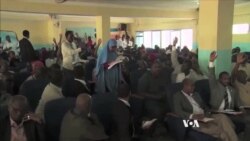While Somalia has long been torn apart by warfare and violence, this year one of the country's biggest challenges has come from within the government, as political infighting curtails the country's progress, threatens security gains and disappoints the international community.
A political standoff in Somalia ended in a vote of no-confidence this month.
By a vote of 153 to 80, Prime Minister Abdiweli Sheikh Ahmed was removed from office, following a feud with President Hassan Sheikh Mohamud over a cabinet reshuffle.
Ahmed was the second prime minister voted out within a year.
Somali political analyst Abdiwahab Sheikh Abdisamad says the political dispute between the two leaders, who come from different clans, is mostly personal.
“It is not issue-based, it's personality-based. 'Either my way, or the highway' — that's what's going on.”
The process was marred by charges of favoritism, clan politics and accusations that lawmakers were promised cash in exchange for no-confidence votes.
The political turbulence has frustrated the international community.
Ahead of a conference on Somalia in the Danish capital Copenhagen in November, U.N. Envoy Nicholas Kay said political instability is threatening Somalia's future.
“The key state-building laws, commissions and processes need to be established," he said. "This is make or break. There is no time to lose.”
President Mohamud, who pushed for the dismissal of the prime minister, has repeatedly defended the government's right to make its own decisions.
“Somali expectations are clearly that Somalia must be allowed to lead its own transformation in a manner that's compatible to its own circumstances,” he said.
Meantime, Somalia has made headway in its fight against al-Qaida linked al-Shabab militants, who have waged a years-long insurgency against the Somali government and international groups working in the country.
A joint military offensive by African Union peacekeepers and the Somali army has forced the Islamist fighters from areas they previously controlled and took back the militants' coastal headquarters, the town of Barawe, this year.
In September, a U.S. drone strike in southern Somalia killed top al-Shabab leader, Ahmed Abdi Godane.
But all of these security gains could be put at risk if the government cannot sort out its internal differences.
“Unless they come together, unless they come back to their senses, unless they have seen and they realize that the country needs a leader who can convert his energy and commitment into results, this will go on,” said Abdisamad, the Somali analyst.
Going forward, the government says it is committed to a strategy known as Vision 2016, which calls for — in the next two years — a constitutional review, completion of the federal system, and an election — lofty goals that analysts say will be difficult to meet given the unpredictable political climate.





